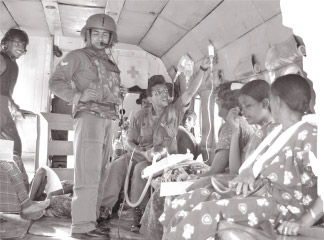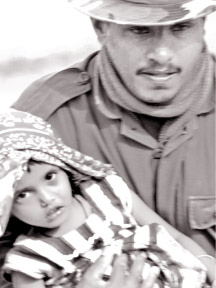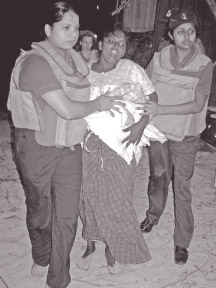Low in substance, low in style
Continuing victimisation through self-righteousness:
By Prof. Rajiva Wijesinha
The Darusman Panel is grossly misleading about the way in which
surrendees were handled. It sneers at Government figures for those in
detention as former combatants, by claiming that “The tally includes
people who did not take part in fighting or who were only recruited in
the final weeks or days”. Since the Government has made it clear that it
included all those who admitted to having been recruited, this is hardly
surprising.
 It may also astonish the Panel to know that questioning these victims
is also useful in recording the techniques used by the LTTE - a process
totally ignored by UNICEF when it was in charge, and failed not only to
stop child recruitment, but even sent children back to areas where they
were promptly re-recruited. It may also astonish the Panel to know that questioning these victims
is also useful in recording the techniques used by the LTTE - a process
totally ignored by UNICEF when it was in charge, and failed not only to
stop child recruitment, but even sent children back to areas where they
were promptly re-recruited.
The Panel claims that there has been no external scrutiny of what is
going on. If it means supervision, it is absolutely correct, since we do
not need those whose stupidity or worse encouraged terrorism to tell us
how to treat our citizens.
If it means no one has visited the site, this is complete nonsense,
because on several occasions I have been there, representatives of the
UN and of Civil Society have been present, usually to work on assistance
for these youngsters. Unfortunately the Panel thinks assistance must be
synonymous with the protection racket some of their informants had been
running.
The bitterness this has resulted in has led to highly tendentious
statements such as claiming that the absence of ‘any external scrutiny
for almost two years, rendered alleged LTTE cadre highly vulnerable to
violations such as rape, torture or disappearance, which could be
committed with impunity’.
This is both vicious as well as stupid. Occasional visits by agencies
such as the ICRC do not prevent such occurrences, as we know full well
from the torture chambers the LTTE maintained in the Vanni, which the
ICRC seemed to have no notion of in spite of regular visits. On the
contrary, the detailed figures we maintain makes it clear that the
Government knows it is accountable, but accountable to its own citizens,
not to those who ignored or were ignorant of violations against Tamils,
Sinhalese and Muslims alike for years.
Psycho-social work
The Panel mocks the psycho-social work of the Commissioner General of
Rehabilitation (CGR), with paragraphs replete with inverted commas on
the lines of a schoolboy essay seeking to be sardonic. In this regard I
can testify to the commitment of the Commissioner, who used part of my
decentralised budget for training of counsellors including former cadre,
in a highly professional manner.
I had dedicated half my budget to these cadre, but thought of
training young ladies to be primary English teachers. The CGR instead
proposed this training program, while also helping me implement high
level entrepreneurship training, details of which are available on the
reconciliation website, www.peaceinsrilanka.org
Incidentally, the Panel does not seem to have consulted those at the
International Organization for Migration (IOM), which has been working
together with the Government in this area. Though initially the IOM too
used to do its own thing, it began under its former Head, Mohamed
Abdiker, to work more responsibly with the Government, something for
which I too can take some credit, after the IOM initially complained
about me to the Foreign Ministry.
The claim was that I wanted them to report to me, but I pointed out
that my letter indicated that they should report to the relevant line
ministry.
 |
|
Members of the Security Forces leading
civilians to safety |
The Foreign Ministry said this was them, but admitted that they had
not received a single copy of project documents for the work the IOM was
doing, as was required. They promised that they would do better about
this in the future, and Mohamed Abdiker sensibly conformed, and became
the favoured agent of the Government for many projects. It, should be
noted that, as the Foreign Ministry pointed out to me the, IOM’s
overheads are much lower than those of most agencies.
Recipient of assistance
The IOM is now working very well with the Government on
rehabilitation, and indeed is the recipient of much assistance which
elements in the international community prefer to give to their own,
rather than to the recipient government. This should not be a problem,
so long as funds are not squandered, and that there is conformity with
government programs and full accountability. Unfortunately, this is what
many of the protection racketeers resist.
The Panel Report also propagates allegations about torture at the
Menik Farm. It asserts that among individuals interrogated were ‘the
doctors, the AGA and two United Nations staff members’, as though it has
to be assumed that such Staff members should not be suspected of
terrorist links. Obviously, they did not ask the former UN Resident
Coordinator about the weapon found on a staff member, which had quite
properly led to investigation previously too.
Ignoring the fact that Sri Lanka had suffered at the hands of an
insidious terrorist organisation for years, the Panel goes on to declare
of those interrogated that “Some of them were tortured as well. The
sounds of beating and screams could be heard from the interrogation
tents. The UNHCR recorded at least nine cases of torture in detention.
Some detainees were taken away and not returned.” It is very strange
that the UNHCR should have recorded such cases since none of these were
shared with the Ministry to whom it was meant to be reported.
If the main intention of the network of informers the Panel has
alluded to was to charge Sri Lanka with war crimes, it is obvious why
they kept silent, but one would have assumed that the rationale of such
monitoring was to nip any abuses in the bud.
Plethora of witnesses
Again, it is strange that, while none of this was discussed at the
time, the Panel should take it as confirmed that the military used
violence to interrogate people in the camps.
There were enough Sri Lankan officials around who would have
prevented this, in addition to the plethora of potential witnesses, or
at least gossips, in the persons of aid workers as well as the
displaced.
But the Panel necessarily assumes that we are both stupid and wicked.
We must also be responsible collectively for everything that is amiss. I
am happy though that the Panel has at least realised that some of those
who disappeared from the camps were not boiled alive or otherwise
disposed of, but simply made their way out surreptitiously.
The claim is that they bribed ‘the military’, whereas the military as
a body were worried about such disappearances, though individuals may
have been complaisant.
I should note that the military were convinced the bribes were being
taken by NGOs and civil officials, which is why they called a halt to
the large numbers of vehicles going in and out.
I have no doubt that individuals from many different institutions
were involved, perhaps not least the UN Security branch which had later
to be investigated.
But I certainly know that in one case the military, as represented by
the official with whom I dealt, were guilty only of inefficiency, and
were as upset as I was about the disappearances.
I refer to the case of a Mrs Malathy Naguleswaran, an elderly citizen
of New Zealand, who had come to assist people in the Vanni, and then
stayed on even when hostilities resumed.
 The New Zealand High Commissioner in Delhi got in touch with me about
this, and I was able to trace her with the help of the UNHCR. I wrote
then to a senior officer to say that a TPN has been sent asking for her
repatriation and asking him to “look into the matter and do whatever is
feasible to expedite this”. The New Zealand High Commissioner in Delhi got in touch with me about
this, and I was able to trace her with the help of the UNHCR. I wrote
then to a senior officer to say that a TPN has been sent asking for her
repatriation and asking him to “look into the matter and do whatever is
feasible to expedite this”.
LTTE-controlled areas
I also suggested that he ‘talk to her to find out about conditions in
the area controlled by the LTTE, and in particular their approach to the
Safe Zone. She would be articulate in English, and is obviously
committed to humanitarian work, so may be able to provide useful
insights into current LTTE practices relating to this field’.
Unfortunately, none of this was done, though I should not be too
irritated given the levels of work that were required, and the state of
exhaustion in which I used to find my contacts each time I visited.
On one of these visits I said that I would like to see Mrs
Naguleswaran myself, but then I was told that she had disappeared. I was
worried initially, but was told that she had probably managed to get
away.
I told the High Commissioner that the chances were she was back in
New Zealand, but asked him to check. He said he would get back to me,
but did not do so, so when I was in Delhi next I asked for a meeting.
The splendidly named Rupert Holborrow was away, but his Deputy came
to my hotel and essentially reassured me that no further action was
required.
In one sense, this was our fault, for we should have cleared the lady
and sent her back to New Zealand straight away.
But in terms of the larger picture, the care extended under difficult
circumstances towards so many thousands, the rapid reintegration of
youngsters trained to hate and kill us, the positive commitment of so
many Sri Lankan officials, and in particular the military, I find there
is much to be proud of. Sadly, the Darusman Panel is unaware of all of
this in its determination to crucify us, if not quite boil us alive.
|

